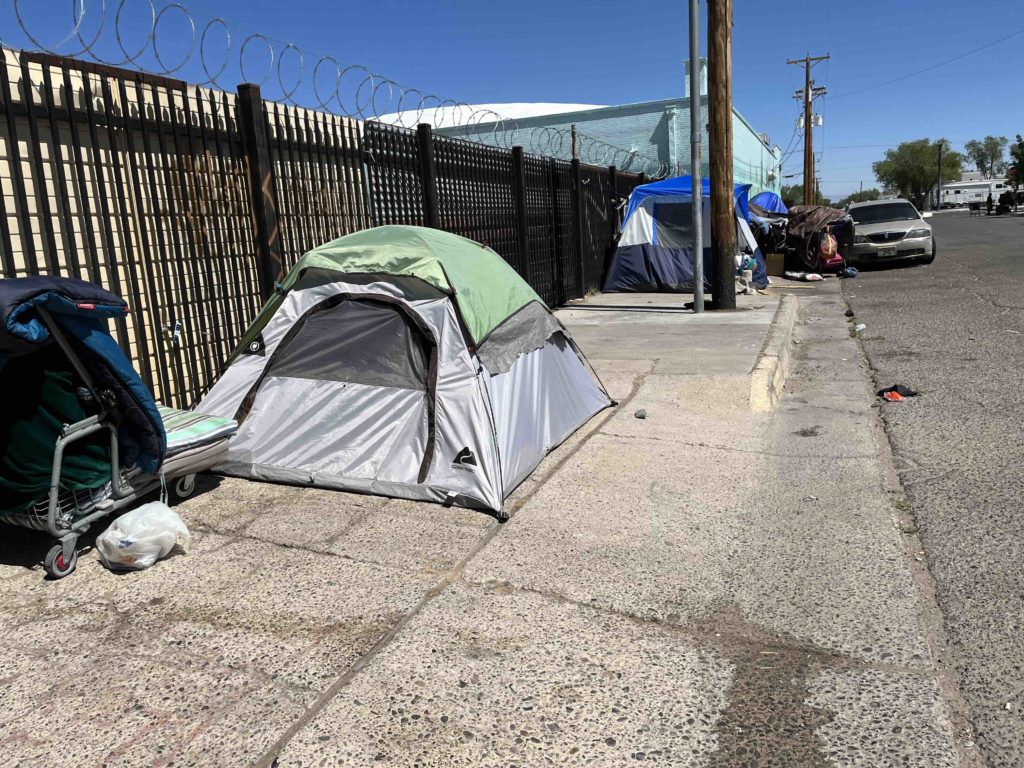The city of Albuquerque is taking a look at its policies toward the homeless population and encampments.
The topic was part of Mayor Tim Keller’s State of the City address. “I have directed all our departments, including legal, to revisit our approach to homelessness, encampments, housing and addiction with an eye towards ‘all of the above’ when it comes to the right blend of enforcements, support, partners and pathways off the streets,” he said. “We will hold the line and be much more assertive when it comes to enforcing our laws, where there are real safety issues and in places where youth programming is happening.”
The topic has been one of great debate recently with the approval and proposed revocation of the Safe Outdoor Spaces program. During the most recent city council meeting, it was noted that more than 100 encampments are cleared each month with the current policies in place, though there are legalities that complicate the process.
“While shelter options like the Westside Emergency Housing Center (WEHC) exist, APD cannot arrest nor compel an unhoused individual to go to this or any other shelter,” a July 6 release from the city reads. “The McClendon v. City of Albuquerque settlement affects when officers can seize or dispose of property, meaning they cannot simply take or dispose of tents, shopping carts or other belongings that might be present at these encampments.”
When such encampments are reported to 311, the release said the city responds to the calls by prioritizing locations that are the most hazardous to the public or individuals living in an encampment. “High-priority locations include areas along roadways, sidewalks and community centers or parks where youth programming is taking place,” the release states. “The cleanup process includes a 72-hour notice and outreach team that offers resources and information about shelters, addiction treatment and permanent housing options.”
“APD arrests people who are putting others in danger or causing a serious nuisance under the current laws, and furthermore, a recently revised policy has been submitted to the DOJ for comment and review,” said APD Deputy Chief Josh Brown.
One of the biggest focal points of the homeless problem in Albuquerque is Coronado Park, which the release states is a result of the COVID-19 pandemic. “CDC guidance was not to move encampments in order to mitigate the spread of COVID-19,” the release states. However, now city leaders are saying the status quo cannot stand at the park. However, consideration needs to be taken in how to make changes appropriately and legally while also preventing the issue from spilling out to surrounding areas.
“We also have to create places for people to go so they don’t just move an encampment down the road,” Keller said. “We are going to improve public safety and provide pathways off the street.”
“Closing Coronado Park, with no alternative locations and a shortage of shelter beds, would mean that the folks currently living there would relocate into nearby neighborhoods or other parks,” said Carol Pierce, director of Family and Community Services. “The city is committed to finding solutions to this issue but cannot do so without a plan to push forward on a better path for neighborhoods an our unhoused population.”
The city has $19 million in the fiscal year budget for housing vouchers, and 18% increase from the previous year to help address the issue.
“We have to recognize the complexity of this national issue as we work toward local solutions here in Albuquerque,” the mayor said. “What people want is a quick and easy answer, but, unfortunately, there isn’t one.
“This won’t be solved by the council passing one bill,” he added. “There is a lot of work to be done, and we need everyone to collaborate to make real progress.”


